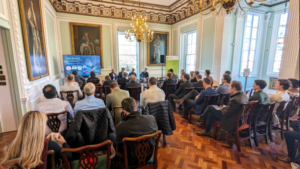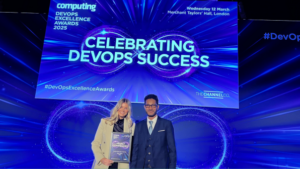Second Open Gov Summit hosted by Zaizi challenges UK public sector to put users at the centre of the IT universe
The second Open Gov Summit took place yesterday April 25th at the Royal Institution of Chartered Surveyors, in the heart of Westminster. London-based open source consultancy Zaizi hosted the fully-booked Summit, which attracted IT professionals from central and local government and third sector organisations. The Summit revealed encouraging progress for open source in the public sector, helped by the government’s decision to adopt open standards last November. This year’s debate also emphasised the growing relevance of Cloud as organisations migrate to more open, flexible architectures and deliver applications through a wider range of devices.
Speakers included: Tariq Rashid, IT Reform, Cabinet Office; Gavin Beckett, Chief Enterprise Architect at Bristol City Council; John Powell, Founder, Alfresco and Aingaran Pillai, CEO and Founder, Zaizi.
Throughout the day, three main themes emerged:
*User requirements must be at the centre of IT’s universe – in contrast to the prevailing approach of IT-centred delivery, new applications and services must be built around user needs. This means they need to be fast, easy to use and modern-looking. One speaker asserted that if an application requires training, it is already too complex. Another delegate pointed out that if usability is ignored, there is a great danger that users will find alternative, potentially insecure ways to share information. The building blocks for these user-centred applications are in the open source world and the same technologies underpinning the new “tech giants” Facebook, Amazon, Google and Twitter.
*Government must embrace ‘commodity’ technology – a surprising theme that emerged was the need for public sector organisations to change from procuring mostly highly-specialised, proprietary software on long-term contracts to ‘commodity’ IT software components built on open standards. Commodity software is less expensive, shareable and easier to get data out of because it is based on open standards, sold in highly competitive markets and available on much more flexible terms. One speaker wanted to emphasise that a move towards commodity software does not come at the expense of innovation, but rather stimulates it because the ‘building-blocks’ can be assembled in unlimited ways to deliver government services that are easy to change as user needs evolve.
*There’s a burning platform for local councils to lead the open source movement – Local councils are under enormous pressure to simultaneously cut costs and deliver even more services in the face of long-term austerity. Bristol City Council, for example, is having to manage a portfolio of fourteen different change programmes simultaneously, out of necessity. This ‘burning platform’ for change and efficiency has stimulated more councils to start seriously considering open source solutions and greater pragmatism, like pooling together with other councils to share common services.
Following yesterday’s success, Zaizi, which hosted the event in partnership with its sponsor Alfresco, has confirmed that it will run Open Gov Summit as an annual event and ongoing dialogue about open source and open standards in government. To register your interest in sponsoring or attending next year’s event, please contact Navneet Hundal at Zaizi – nhundall@zaizi.com.
Aingaran Pillai, CEO of Zaizi and organiser commented: “In this second event the debate has really matured. The public sector no longer questions the suitability of open source, but has moved on to finer issues surrounding procurement, IT strategy and application delivery. There is still progress to be made when it comes to embracing open source’s full potential and breaking old mind-sets, but I believe this past year the UK has made good progress.”
Latest content
-

From ScanApp to Lego demos — What you need to know about Security & Policing 2025
Published on: 1 April, 2025 -

Truth, trust and transformation — 4 key takeaways from Zaizi’s AI in government event
Published on: 14 March, 2025 -

Zaizi talent shines at Computing DevOps Excellence Awards 2025
Published on: 13 March, 2025 -

Advancing DevOps practices with AI —lessons from AWS re:Invent
Published on: 10 March, 2025
